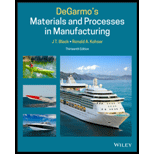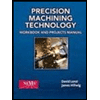
Degarmo's Materials And Processes In Manufacturing
13th Edition
ISBN: 9781119492825
Author: Black, J. Temple, Kohser, Ronald A., Author.
Publisher: Wiley,
expand_more
expand_more
format_list_bulleted
Concept explainers
Textbook Question
Chapter 22, Problem 2P
A 2 in.-diameter bar of steel was turned at 284 rpm, and tool failure occurred in 10 min. The speed was changed to 132 rpm, and the tool failed in 30 min of cutting. Assume that a straight-line relationship exists. What cutting speed should be used to obtain a 60-min tool life of V60?
Expert Solution & Answer
Want to see the full answer?
Check out a sample textbook solution
Students have asked these similar questions
First monthly exam
Gas dynamics
Third stage
Q1/Water at 15° C flow through a 300 mm diameter riveted steel pipe, E-3 mm with a head loss of 6 m in
300 m length. Determine the flow rate in pipe. Use moody chart.
Q2/ Assume a car's exhaust system can be approximated as 14 ft long and 0.125 ft-diameter cast-iron pipe (
= 0.00085 ft) with the equivalent of (6) regular 90° flanged elbows (KL = 0.3) and a muffler. The
muffler acts as a resistor with a loss coefficient of KL= 8.5. Determine the pressure at the beginning of the
exhaust system (pl) if the flowrate is 0.10 cfs, and the exhaust has the same properties as air.(p = 1.74 ×
10-3 slug/ft³, u= 4.7 x 10-7 lb.s/ft²) Use moody chart
(1)
MIDAS
Kel=0.3
Q3/Liquid ammonia at -20°C is flowing through a 30 m long section of a 5 mm diameter copper tube(e =
1.5 × 10-6 m) at a rate of 0.15 kg/s. Determine the pressure drop and the head losses.
.μ= 2.36 × 10-4 kg/m.s)p = 665.1 kg/m³
2/Y
Y+1
2Cp
Q1/ Show that
Cda
Az x
P1
mactual
Cdf
Af
R/T₁
2pf(P1-P2-zxgxpf)
Q2/ A simple jet carburetor has to supply 5 Kg of air per minute. The air is at a pressure of 1.013 bar
and a temperature of 27 °C. Calculate the throat diameter of the choke for air flow velocity of 90 m/sec.
Take velocity coefficient to be 0.8. Assume isentropic flow and the flow to be compressible.
Quiz/ Determine the air-fuel ratio supplied at 5000 m altitude by a carburetor which is adjusted to give
an air-fuel ratio of 14:1 at sea level where air temperature is 27 °C and pressure is 1.013 bar. The
temperature of air decreases with altitude as given by the expression
The air pressure decreases with altitude as per relation h = 19200 log10 (1.013), where P is in bar. State
any assumptions made.
t = ts
P
0.0065h
36
2) Use the method of MEMBERS to determine the true magnitude and
direction of the forces in members1 and 2 of the frame shown below
in Fig 3.2.
300lbs/ft
member-1
member-2
30°
Fig 3.2.
https://brightspace.cuny.edu/d21/le/content/433117/viewContent/29873977/View
Chapter 22 Solutions
Degarmo's Materials And Processes In Manufacturing
Ch. 22 - For metal-cutting tools, what is the most...Ch. 22 - What is hot hardness compared to hardness?Ch. 22 - Prob. 3RQCh. 22 - Why is impact strength an important property in...Ch. 22 - Cemented carbide tools are made by a powder...Ch. 22 - What are the primary considerations in tool...Ch. 22 - What is the general strategy behind coated tools?Ch. 22 - Prob. 8RQCh. 22 - How is a CBN tool manufactured?Ch. 22 - Prob. 10RQ
Ch. 22 - Prob. 11RQCh. 22 - Discuss the constraints in the selection of a...Ch. 22 - What does cemented mean in the manufacture of...Ch. 22 - What advantage do ground carbide inserts have over...Ch. 22 - What is a chip groove?Ch. 22 - What is the DCL?Ch. 22 - Suppose you made four beams out of carbide, HSS,...Ch. 22 - Multiple coats or layers are put on the carbide...Ch. 22 - What tool material would you recommend for...Ch. 22 - What makes the process that makes TiC coatings for...Ch. 22 - Why does a TiN-coated tool consume less power than...Ch. 22 - For what work material are CBN tools more commonly...Ch. 22 - Why is CBN better for machining steel than...Ch. 22 - What is the typical coefficient of variation for...Ch. 22 - What is meant by the statement Tool life is a...Ch. 22 - The typical value of a coefficient of variation in...Ch. 22 - Machinability is defined in many ways. Explain how...Ch. 22 - What are the chief functions of cutting fluids?Ch. 22 - Prob. 29RQCh. 22 - Why is the PVD process used to coat HSS tools?Ch. 22 - Why is there no universal cutting tool material?Ch. 22 - What is an 18-4-1 HSS composed of?Ch. 22 - Over the years, tool materials have been developed...Ch. 22 - Why is the rigidity of the machine tool an...Ch. 22 - Explain how it can be that the tool wears when it...Ch. 22 - What is a honed edge on a cutting tool and why is...Ch. 22 - Suppose you have a turning operation using a tool...Ch. 22 - A 2 in.-diameter bar of steel was turned at 284...Ch. 22 - Prob. 3PCh. 22 - The following data have been obtained for...Ch. 22 - In the insert is set with a 0 side cutting-edge...Ch. 22 - Prob. 6PCh. 22 - Here is a single point tool. Identify angles A...Ch. 22 - Figure 22.B gives data for cutting speed and tool...
Additional Engineering Textbook Solutions
Find more solutions based on key concepts
Write a SELECT statement that will return the TradingSymbol column only from the rows where SellingPrice is gre...
Starting Out with Java: From Control Structures through Objects (7th Edition) (What's New in Computer Science)
You___a function to execute it. a. define b. call c. import d. export
Starting Out with Python (4th Edition)
Summarize the distinction between batch processing and interactive processing.
Computer Science: An Overview (13th Edition) (What's New in Computer Science)
2-1 List the five types of measurements that form the
basis of traditional ptane surveying-
Elementary Surveying: An Introduction To Geomatics (15th Edition)
The current source in the circuit shown generates the current pulse
Find (a) v (0); (b) the instant of time gr...
Electric Circuits. (11th Edition)
Porter’s competitive forces model: The model is used to provide a general view about the firms, the competitors...
Management Information Systems: Managing The Digital Firm (16th Edition)
Knowledge Booster
Learn more about
Need a deep-dive on the concept behind this application? Look no further. Learn more about this topic, mechanical-engineering and related others by exploring similar questions and additional content below.Similar questions
- Can you solve this for me?arrow_forward5670 mm The apartment in the ground floor of three floors building in Fig. in Baghdad city. The details of walls, roof, windows and door are shown. The window is a double glazing and air space thickness is 1.3cm Poorly Fitted-with Storm Sash with wood strip and storm window of 0.6 cm glass thickness. The thickness of door is 2.5 cm. The door is Poor Installation. There are two peoples in each room. The height of room is 280 cm. assume the indoor design conditions are 25°C DBT and 50 RH, and moisture content of 8 gw/kga. The moisture content of outdoor is 10.5 gw/kga. Calculate heat gain for living room : الشقة في الطابق الأرضي من مبنى ثلاثة طوابق في مدينة بغداد يظهر في مخطط الشقة تفاصيل الجدران والسقف والنوافذ والباب. النافذة عبارة عن زجاج مزدوج وسمك الفراغ الهوائي 1.3 سم ضعيف الاحكام مع ساتر حماية مع إطار خشبي والنافذة بسماكة زجاج 0.6 سم سماكة الباب 2.5 سم. الباب هو تركيب ضعيف هناك شخصان في كل غرفة. ارتفاع الغرفة 280 سم. افترض أن ظروف التصميم الداخلي هي DBT25 و R50 ، ومحتوى الرطوبة 8…arrow_forwardHow do i solve this problem?arrow_forward
- Q4/ A compressor is driven motor by mean of a flat belt of thickness 10 mm and a width of 250 mm. The motor pulley is 300 mm diameter and run at 900 rpm and the compressor pulley is 1500 mm diameter. The shaft center distance is 1.5 m. The angle of contact of the smaller pulley is 220° and on the larger pulley is 270°. The coefficient of friction between the belt and the small pulley is 0.3, and between the belt and the large pulley is 0.25. The maximum allowable belt stress is 2 MPa and the belt density is 970 kg/m³. (a) What is the power capacity of the drive and (b) If the small pulley replaced by V-grooved pulley of diameter 300 mm, grooved angle of 34° and the coefficient of friction between belt and grooved pulley is 0.35. What will be the power capacity in this case, assuming that the diameter of the large pulley remain the same of 1500 mm.arrow_forwardYou are tasked with designing a power drive system to transmit power between a motor and a conveyor belt in a manufacturing facility as illustrated in figure. The design must ensure efficient power transmission, reliability, and safety. Given the following specifications and constraints, design drive system for this application: Specifications: Motor Power: The electric motor provides 10 kW of power at 1,500 RPM. Output Speed: The output shaft should rotate at 150 rpm. Design Decisions: Transmission ratio: Determine the necessary drive ratio for the system. Shaft Diameter: Design the shafts for both the motor and the conveyor end. Material Selection: Choose appropriate materials for the gears, shafts. Bearings: Select suitable rolling element bearings. Constraints: Space Limitation: The available space for the gear drive system is limited to a 1-meter-long section. Attribute 4 of CEP Depth of knowledge required Fundamentals-based, first principles analytical approach…arrow_forward- | العنوان In non-continuous dieless drawing process for copper tube as shown in Fig. (1), take the following data: Do-20mm, to=3mm, D=12mm, ti/to=0.6 and v.-15mm/s. Calculate: (1) area reduction RA, (2) drawing velocity v. Knowing that: ti: final thickness V. Fig. (1) ofthrearrow_forward
- A direct extrusion operation produces the cross section shown in Fig. (2) from an aluminum billet whose diameter 160 mm and length - 700 mm. Determine the length of the extruded section at the end of the operation if the die angle -14° 60 X Fig. (2) Note: all dimensions in mm.arrow_forwardFor hot rolling processes, show that the average strain rate can be given as: = (1+5)√RdIn(+1)arrow_forward: +0 usão العنوان on to A vertical true centrifugal casting process is used to produce bushings that are 250 mm long and 200 mm in outside diameter. If the rotational speed during solidification is 500 rev/min, determine the inside radii at the top and bottom of the bushing if R-2R. Take: -9.81 mis ۲/۱ ostrararrow_forward
- : +0 العنوان use only In conventional drawing of a stainless steel wire, the original diameter D.-3mm, the area reduction at each die stand r-40%, and the proposed final diameter D.-0.5mm, how many die stands are required to complete this process. онarrow_forwardIn non-continuous dieless drawing process for copper tube as shown in Fig. (1), take the following data: Do-20mm, to=3mm, D=12mm, ti/to=0.6 and vo-15mm/s. Calculate: (1) area reduction RA, (2) drawing velocity v. Knowing that: t₁: final thickness D₁ V. Fig. (1) Darrow_forwardA vertical true centrifugal casting process is used to produce bushings that are 250 mm long and 200 mm in outside diameter. If the rotational speed during solidification is 500 rev/min, determine the inside radii at the top and bottom of the bushing if R-2Rb. Take: 8-9.81 m/sarrow_forward
arrow_back_ios
SEE MORE QUESTIONS
arrow_forward_ios
Recommended textbooks for you
 Precision Machining Technology (MindTap Course Li...Mechanical EngineeringISBN:9781285444543Author:Peter J. Hoffman, Eric S. Hopewell, Brian JanesPublisher:Cengage Learning
Precision Machining Technology (MindTap Course Li...Mechanical EngineeringISBN:9781285444543Author:Peter J. Hoffman, Eric S. Hopewell, Brian JanesPublisher:Cengage Learning

Precision Machining Technology (MindTap Course Li...
Mechanical Engineering
ISBN:9781285444543
Author:Peter J. Hoffman, Eric S. Hopewell, Brian Janes
Publisher:Cengage Learning
The Most Common Metal Machining Processes (Metal Machining Video 1); Author: Sofeast Ltd;https://www.youtube.com/watch?v=uxVJ3qtezGw;License: Standard YouTube License, CC-BY
Machining process and Machine Tools; Author: Amar Gandhi;https://www.youtube.com/watch?v=X2mUJ8baaE0;License: Standard Youtube License